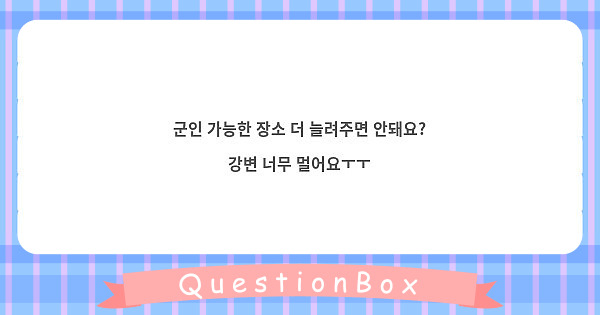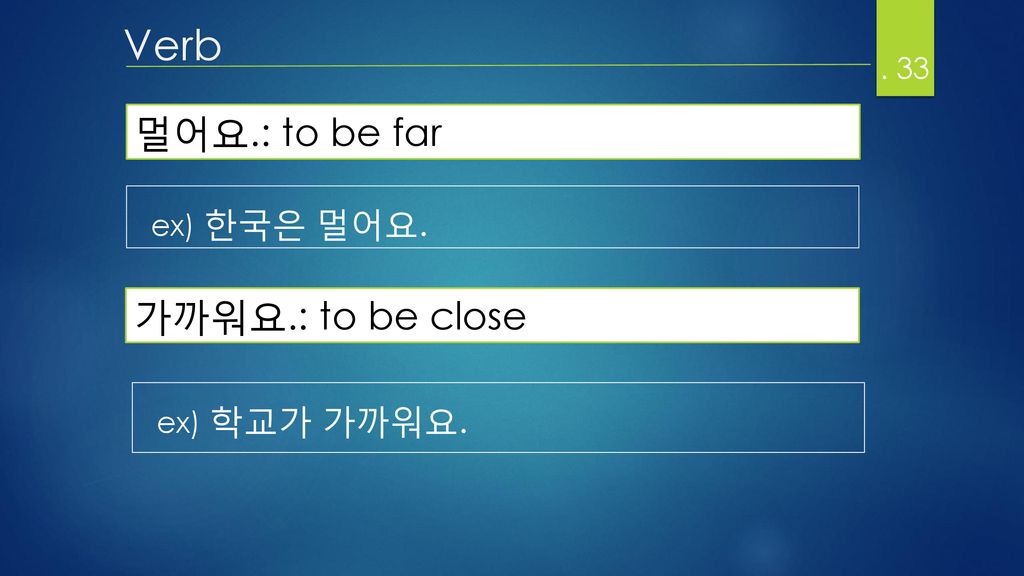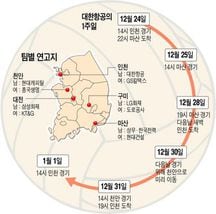멀어요
– 멀어요의 의미와 사용법
멀어요는 한국어에서 “멀다”라는 동사의 가벼운 버전으로, 무언가가 먼 것을 나타내는 표현입니다. 주로 거리를 나타내는 단위로 사용되며, 상대적인 개념인 만큼 어느 정도의 거리를 의미하는지는 맥락에 따라 달라질 수 있습니다.
– 거리를 나타내는 단위
멀어요에서 “멀다”는 거리를 나타내는 말로 사용되기 때문에, 실제로 멀다는 개념을 표현하는 단위는 주로 킬로미터나 미터와 같은 거리 단위로 사용됩니다. 또한, 표면상의 거리뿐만 아니라 시간적인 멀기를 나타낼 때도 사용됩니다.
– 멀어지는 원인과 예시
멀어지는 상황은 다양한 원인에 의해 발생할 수 있습니다. 가장 일반적인 예로는 지리적인 요인으로 인한 멀어짐이 있습니다. 예를 들어, 두 사람이 서로 다른 지역에 살게 된다면 이들의 관계는 자연스럽게 멀어지게 됩니다.
또한, 일상 생활의 변화로 인해 멀어지는 상황도 있습니다. 일이나 공부로 바쁜 일정 때문에 시간을 함께 보내는 것이 어려워진다거나, 서로 다른 관심사나 가치관을 가지게 되는 경우에도 멀어질 수 있습니다.
– 멀어지는 상황에서의 대처법
멀어지는 상황에서는 적극적으로 대처하는 것이 중요합니다. 먼저, 소통을 이어가는 것이 중요합니다. 상대방과의 대화를 통해 서로의 생각과 감정을 솔직하게 표현하고 이해하는 것이 중요합니다.
또한, 시간을 함께 보내는 것이 어려운 상황에서는 대안을 찾아야 합니다. 혹은 서로의 일정을 조율하여 가능한 만큼 자주 만남을 이어갈 수 있도록 노력해야 합니다.
– 거리를 가깝게 만드는 방법과 중요성
거리를 가깝게 만들기 위해서는 소통과 공감이 중요합니다. 서로의 이야기를 귀 기울여 들을 뿐만 아니라, 이해하고 공감하는 자세를 가져야 합니다. 또한 함께하는 시간을 소중히 여기고, 서로의 필요성을 느낄 수 있는 경험을 함께 나누는 것도 중요합니다.
거리를 가깝게 만드는 것은 건강한 관계를 유지하는 데에 매우 중요합니다. 서로에게 필요한 지지와 안정감을 주고 받을 수 있고, 언제든 소통을 통해 문제를 해결할 수 있는 기반을 마련할 수 있습니다.
– 멀어진 관계의 영향과 해결책
멀어진 관계는 양측 간의 거리와 소통의 부재로 인해 심리적인 영향을 줄 수 있습니다. 또한 감정적인 거리가 커지게 되면, 서로 이해하지 못하고 불만이 쌓일 수 있습니다. 이러한 문제를 해결하기 위해서는 상대방의 입장을 이해하고, 서로 소통하며 문제를 해결하는 것이 필요합니다.
멀어진 관계를 해결할 수 있는 방법 중 하나는 상대방과의 관계를 활성화시키는 것입니다. 함께하는 즐거운 활동이나 대화를 통해 서로의 관심사와 가치관을 공유하고, 서로를 이해할 수 있는 기회를 만들어야 합니다.
– 멀어지는 감정과 관련된 문제점과 극복 방법
멀어지는 관계에서는 감정적인 거리가 커지기 때문에, 상대방의 감정을 파악하기 어려울 수 있습니다. 이는 서로의 감정이 충돌하거나 무시되는 상황을 초래할 수 있기 때문에 문제점이 될 수 있습니다.
이러한 문제점을 극복하기 위해서는 서로의 감정에 대한 이해와 공감이 필요합니다. 이를 위해 문제가 발생했을 때 서로의 감정을 솔직하게 표현하고, 문제를 해결하기 위한 방법을 함께 모색하는 것이 중요합니다.
– 멀어지는 사회적 트렌드와 영향
지금은 멀어짐이라는 현상이 사회적으로 더 많이 경험되고 있습니다. 이는 현대 사회에서 삶의 스타일과 가치관이 다양해지고 변화하는 것과 관련이 있습니다.
사회적 트렌드로 인해 개인의 자유와 자기계발에 집중하는 경향이 증가하고, 이는 자연스럽게 사람들 사이의 관계를 멀어지게 합니다. 이러한 상황에서는 소통과 공감, 상대방과의 관계를 활성화시키는 노력이 더욱 중요해집니다.
FAQs:
1. 멀어요는 어떤 의미인가요?
멀어요는 한국어에서 “멀다”라는 동사의 가벼운 형태로, 무언가가 먼 것을 나타내는 표현입니다.
2. 멀어요는 주로 어떤 상황에서 사용되나요?
멀어요는 주로 거리를 나타내는 맥락에서 사용됩니다. 두 사람이 서로 다른 지역에 살거나, 시간적으로 멀리 떨어져 있는 상황에서 사용됩니다.
3. 거리를 가깝게 만드는 방법은 무엇인가요?
거리를 가깝게 만들기 위해서는 소통과 공감이 중요합니다. 서로 이해하고 이야기를 공유하며, 함께하는 시간을 소중히 여기는 것이 중요합니다.
4. 멀어진 관계를 해결하는 방법은 무엇인가요?
멀어진 관계를 해결하기 위해서는 상대방과의 관계를 활성화시키는 것이 중요합니다. 함께하는 활동이나 대화를 통해 서로를 이해하고 공감할 수 있는 기회를 만들어야 합니다.
5. 멀어진 관계에서 발생하는 문제점은 무엇인가요?
멀어진 관계에서는 감정적인 거리가 커지기 때문에 서로의 감정을 파악하기 어려울 수 있습니다. 이는 서로의 감정이 충돌하거나 무시되는 상황을 초래할 수 있습니다.
6. 멀어지는 사회적 트렌드와는 무엇인가요?
멀어지는 사회적 트렌드는 현대 사회에서 삶의 스타일과 가치관이 다양해지고 변화하는 것과 관련이 있습니다. 이는 개인의 자유와 자기계발에 집중하는 경향이 증가하며, 사람들 사이의 관계를 멀어지게 합니다.
사용자가 검색한 키워드: 멀어요 멀다 conjugation, 멀다
Categories: Top 41 멀어요
너무 멀어요 1982 계은숙
여기에서 자세히 보기: thichnaunuong.com
멀다 conjugation
Plain Conjugation:
In its plain form, 멀다 is conjugated differently depending on verb endings. Let’s take a look at the common conjugation patterns:
1. Present Tense:
When using the verb ending -아/어요 (-a/eoyo), 멀다 conjugates as 멉니다 (meumnida). For example:
– 집이 너무 멉니다. (jibi neomu meumnida) – “The house is very far.”
2. Past Tense:
For the past tense, add -았/었어요 (-at/eosseoyo) to 멀다, resulting in 멀었습니다 (meoleossseumnida). For example:
– 그 공원은 멀었습니다. (geu gongwoneun meoleossseumnida) – “That park was far.”
3. Future Tense:
To express the future tense, attach -(으)ㄹ 거예요 ((eu)l geoyeyo) to 멀다, giving us 멀 것입니다 (meol geosseumnida). For example:
– 내일은 학교가 멀 것입니다. (naeireun hakgyoga meol geosseumnida) – “Tomorrow, school will be far.”
Honorific Conjugation:
When showing respect or politeness, the honorific verb ending -습니다 (-seumnida) can be added to 멀다. For instance:
– 집이 너무 멉니다. (jibi neomu meosseumnida) – “The house is very far.”
Tense Conjugations:
1. Present Progressive Tense:
To express the present progressive tense, use the verb ending -고 있다. Thus, 멀다 becomes 멀고 있다 (meolgo itda). For example:
– 그들은 도서관 쪽으로 멀고 있어요. (geudeureun doseogwan jjogeuro meolgo isseoyo) – “They are heading towards the library.”
2. Past Progressive Tense:
For the past progressive tense, add -고 있었어요 (-go isseosseoyo) to 멀다, resulting in 멀고 있었습니다 (meolgo isseossseumnida). For example:
– 어제 그들은 피곤해서 멀고 있었습니다. (eoje geudeureun pigonhaeseo meolgo isseossseumnida) – “Yesterday, they were tired and kept going far.”
3. Future Progressive Tense:
To express the future progressive tense, use the verb ending -고 있을 거예요 (-go isseul geoyeyo). For example:
– 내일 그들은 우리를 추격하려고 멀고 있을 거예요. (naeil geudeureun urireul chugyeokharyeogo meolgo isseul geoyeyo) – “Tomorrow, they will be trying to chase us from far away.”
Common Irregularities:
The verb 멀다 follows several irregular conjugation patterns, which are important to grasp for proper usage.
1. Negative Conjugation:
To create the negative form of 멀다, the -ㄹ- irregular form is used, giving us 멀지 않다 (meolji anhda). For example:
– 그 쇼핑몰은 멀지 않아요. (geu syopingmoleun meolji anhayo) – “That shopping mall isn’t far.”
2. Past Negative Conjugation:
To conjugate the past negative form, use 멀지 않았다 (meolji anhatda). For example:
– 그 숙소는 멀지 않았습니다. (geu sugsoneun meolji anhatseumnida) – “That accommodation wasn’t far.”
Frequently Asked Questions:
Q1: How can I determine which conjugation pattern to use?
A1: The conjugation pattern depends on the tense, formality, and speech level you want to express. By understanding the context and the appropriate verb ending for each situation, you can accurately conjugate 멀다.
Q2: Are there any other verb endings used with 멀다?
A2: Yes, there are various verb endings used with 멀다, including the imperative form, passive form, causative form, and more. However, these are more advanced topics that are not covered in this article.
Q3: Can 멀다 be used figuratively?
A3: Yes, 멀다 can be used metaphorically to express distance in both physical and abstract senses. For example, you can say “마음이 멀다” (maeumi meoldda), meaning “to have a distant heart” or “to be emotionally distant.”
Q4: Are there any slang or colloquial forms of 멀다?
A4: While 멀다 itself is not commonly changed in slang or colloquial language, you may come across expressions that use 멀다 indirectly, such as 멉하다 (meophada) or 멀까했다 (meolgakhada), which mean “to seem far” or “to think it is far.”
Conclusion:
Understanding the conjugation of 멀다 is essential for effective communication in Korean. By learning its plain and honorific forms, as well as different tense conjugations, learners can successfully express the concept of distance accurately. Remember to practice these conjugations and pay attention to common irregularities to solidify your understanding of 멀다. Happy learning!
멀다
In Korean, 멀다 is often used in everyday conversations to describe physical distances. It can be used to express the distance between two locations or to indicate the proximity of an object or person. For example, “이곳에서 학교까지 멀다” (Igoteseo haggyokkaji meolda) means “The school is far from here.” Similarly, 멀다 can be used to describe the distance between two cities or countries, as in “서울과 부산은 서로 멀다” (Seoulgwa Busaneun seoro meolda), which means “Seoul and Busan are far from each other.”
It is important to note that the perception of distance may vary from person to person. What one person may consider far, another person may perceive as a short distance. Therefore, the usage of 멀다 is subjective and dependent on the individual’s perspective and the context of the conversation.
Frequently Asked Questions about 멀다:
Q: Are there any synonyms for 멀다?
A: Yes, there are several synonyms for 멀다 in Korean. Some commonly used alternatives include 먼 (meon), 거리가 먼 (georiga meon), or 멀리 있는 (meolli itneun). These synonyms can be used interchangeably to convey the idea of distance.
Q: Can 멀다 be used metaphorically?
A: Yes, 멀다 can be used metaphorically to express emotional or abstract distances. For example, “우리는 마음이 멀어졌다” (Uri-neun maeumi meoreojyeotda) means “Our hearts grew distant,” indicating a strain in a relationship or emotional disconnect.
Q: How is 멀다 different from 가깝다 (gakkapda)?
A: 가깝다 (gakkapda) is the opposite of 멀다 (meolda), meaning “close” in English. While 멀다 refers to a significant distance, 가깝다 is used to describe proximity or short distances. For instance, “집에서 학교가 가깝다” (Jibeseo haggyokka gakkapda) means “The school is close to home.”
Q: Are there any regional variations in the usage of 멀다?
A: While the basic meaning of 멀다 remains constant throughout Korea, there might be slight differences in how it is used or pronounced in different regions. These variations are typically influenced by local dialects or accents.
Q: Can 멀다 be used in past or future tenses?
A: Yes, 멀다 can be conjugated into various tenses to express distance in the past, present, or future. For example, “어제부터 멀어지고 있다” (Eojebuteo meoreojigo itda) means “It has been getting farther since yesterday,” while “내일은 더 멀어질 것 같아” (Naeireun deo meoreojil geot gata) translates to “I think it will be even farther tomorrow.”
Q: How does 멀다 relate to transportation in Korea?
A: In the context of transportation, 멀다 is often used when discussing how far a particular place or destination is from the starting point. For instance, “지하철역이 여기서 멀어서 걸어가기 어려워요” (Jihacheolyeog-i yeogiseo meoreoseo georeogagi eoryeowoyo) means “The subway station is far from here, so it’s difficult to walk.” This usage is helpful for travelers or individuals unfamiliar with the local transport system.
Q: Is 멀다 used in formal or informal situations?
A: 멀다 is a neutral term that can be used in both formal and informal situations. However, in formal settings such as business meetings or official documents, more professional or formal expressions may be preferred.
In conclusion, understanding the usage and context of 멀다 is crucial for effective communication in Korean. Whether describing physical distances or metaphorical disconnects, 멀다 allows speakers to convey the concept of “far” with ease. By incorporating 멀다 into everyday conversations, learners of Korean can enhance their language skills and better express the spatial relationships between objects, places, and emotions.
주제와 관련된 이미지 멀어요

멀어요 주제와 관련된 이미지 36개를 찾았습니다.


![왕초보 필수 영어] 얼마나 멀어요?(거리 묻기)/우리~할래?(청유 하기)/가서~가져와(심부름 부탁) - YouTube 왕초보 필수 영어] 얼마나 멀어요?(거리 묻기)/우리~할래?(청유 하기)/가서~가져와(심부름 부탁) - Youtube](https://i.ytimg.com/vi/SSoIrL_9CqE/maxresdefault.jpg)






![7] I've got a long way to go-저는 아직 갈 길이 멀어요-English [영어 발음/단어/표현/문법 학습] - YouTube 7] I'Ve Got A Long Way To Go-저는 아직 갈 길이 멀어요-English [영어 발음/단어/표현/문법 학습] - Youtube](https://i.ytimg.com/vi/DLLV4_66ogA/maxresdefault.jpg)

![KIIP Lớp 1 - Sơ cấp 1] Bài 15: 집에서 회사까지 얼마나 걸려요? Từ nhà đến công ty mất bao lâu? - Hàn Quốc Lý Thú Kiip Lớp 1 - Sơ Cấp 1] Bài 15: 집에서 회사까지 얼마나 걸려요? Từ Nhà Đến Công Ty Mất Bao Lâu? - Hàn Quốc Lý Thú](https://hanquoclythu.com/wp-content/uploads/2018/04/152.png)

![프랑스어 첫걸음] 32. 여기에서 멀어요? : 네이버 포스트 프랑스어 첫걸음] 32. 여기에서 멀어요? : 네이버 포스트](https://post-phinf.pstatic.net/MjAyMDA3MjRfMTA2/MDAxNTk1NTc5NjQ4MDUy.aWCkjpnOl0jhVe_oegyq2s8xqHKtxwUyTGxQu9Kpot0g.brdvyCuq8LDyKutS-QQhhrrhTEgeXwSoy3PMisJnYQ0g.PNG/Fr_thumb32.png?type=w1200)

![랭픽:중국어회화] '여기서 멀어요?' 중국어로? < 중국어회화 < 어학 < 라이프 < 기사본문 - 폴리스TV 랭픽:중국어회화] '여기서 멀어요?' 중국어로? < 중국어회화 < 어학 < 라이프 < 기사본문 - 폴리스Tv](https://cdn.policetv.co.kr/news/photo/202204/34410_34926_440.png)

Article link: 멀어요.
주제에 대해 자세히 알아보기 멀어요.
- Từ điển Hàn Việt “멀어요” – là gì?
- “멀어요”을 영어로 번역 – Glosbe 다국어 사전
- 멀다
- What is the meaning of “멀어요 “? – Question about Korean
- italki – 멀어요 or 멀이에요? The sentence I’m wondering about is
- What does “여기서 멀어요?” (yeogiseo meol-eoyo?) mean in …
- 멀어요 – translation from Korean to English with examples
더보기: https://thichnaunuong.com/entertainment/